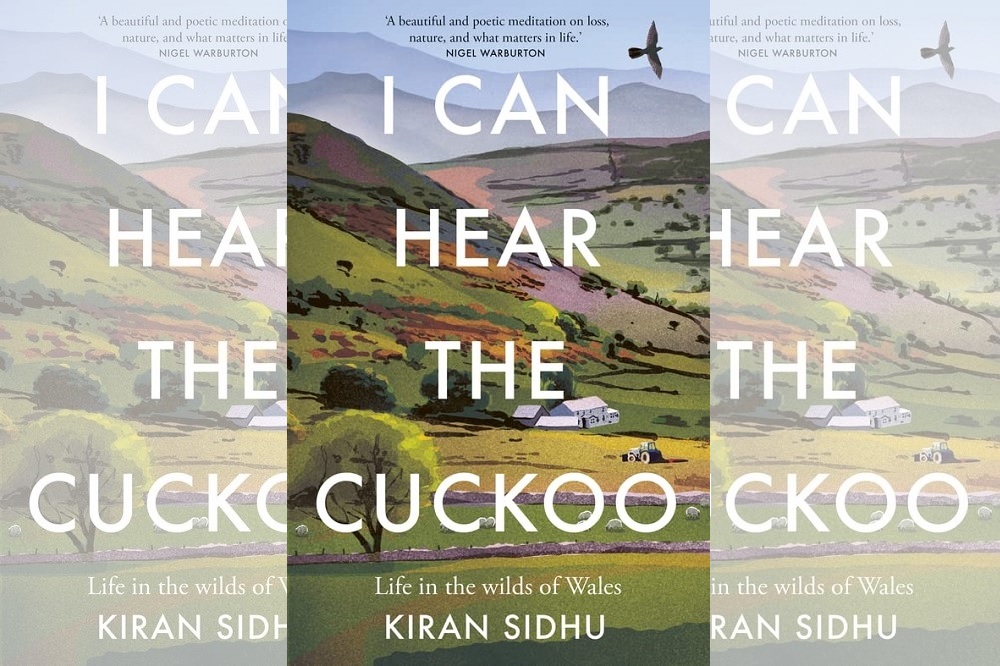Review: I Can Hear the Cuckoo – Life in the wilds of Wales by Kiran Sidhu

Lottie Williams
At the very start of this moving and beautiful nature memoir, author Kiran Sidhu brings us hurtling headfirst into both the action and her emotions.
At first we feel her absolute joy of hearing a cuckoo for the first time that year and rushing to tell farmer Wilf. But in the following pages we are hit face first with the ‘excruciating, unfathomable pain’ Kiran felt several years earlier when her mother died from cancer.
It is both heart wrenching and primal to read, and it captures me from the start. Though the content is deep, the pace flows easily throughout.
This roller coaster of a beginning continues as Kiran navigates her way through the ups and downs of her childhood with an alcoholic father, her mother’s illness and death, and the effect it had on her family.
It is a story of heartache and hope, of finding a sense of contentment in a life so far removed from anything she had experienced before.
After her mother’s death, Kiran and her husband Simon took the decision to move from London to a Welsh valley near Lampeter. The need to leave a bubbling toxicity and carve out a new place for her is strong, and the theme of belonging features heavily throughout this story.
City girl
Kiran is a self-confessed city girl, brown in a valley of white, and she questions her Indian heritage and culture. She is challenged by the concept of home, looks to hiraeth and, rather bravely, leans into country living full throttle as she searches for the answers. Kiran wants to experience life again, but from a different viewpoint.
She chooses to watch a pig slaughter, swims for the first time in a cold Welsh sea, clips a goat’s hooves, feeds an orphaned lamb, partakes in the rescuing of a red kite.
I found myself following the illustrated map at the beginning of the book so I could picture Kiran on her daily walking route, visiting the neighbouring farms and landmarks as she did.
Then I found myself Google Mapping the area on Satellite mode (I live in Carmarthen, which in fact is not far, and I do find maps fascinating to explore). This is how much Kiran drew me into her place.
Voice
Through a story set firmly within the seasons, she manages to capture the valley in all its glory. The red squirrels, cuckoos, adders and wild horses. The warmth of the summer and the snow in December. The highland cattle at the top of the lane. The sounds of sheepdog barking, a chainsaw revving, the distressed lambs calling for their mothers when they are being weaned.
We may think of the countryside as quiet, but Kiran rightly points out, ‘the countryside has its own voice’. Human population density may be much less here than in London, but her new home is never ever silent.
It is the stories of the people, however, that really bring this Welsh valley to life.
Among others, there are Donna and Andy who run the farm and B&B Caer Cadwgan, Sarah, Rod and Glen who share the same driveway as Kiran and Simon (great for sledging down), colourful Hara who brings the party to life, Andrew who tells the SAS story, Tess who takes Kiran swimming on New Year’s Day.
This is a community of neighbours who rally together, show kindness, and each of them give something to Kiran’s healing that is special and unique. The people make the place and the place makes the people.
Rooted
But the most captivating person is Wilf, a farmer in his seventies who loves his valley and his work. He respects ‘the rhythm and the timing of the earth’. He is ‘rooted like a tree’ with such a sense of belonging and commitment. His surroundings are his clock.
Many times throughout the book, Kiran describes how Wilf quietly opens her eyes to the beauty of nature in the valley which is ‘cut in the shape of his heart’. I don’t think there is a more beautiful way of describing a person’s love for their home.
Autumn brings with it a melancholy feeling which pervades into the depths of winter and leaves Kiran with such a sense of loss.
Her mother, Piari, grew weaker through December 2014, died on Christmas Eve and was buried over the new year. Through the last section of the book, Kiran evocatively brings to light the battle her mother and family faced.
It is a brave write and heartbreaking to read, the emotions stifled in the heavy air which cloaked the hospital room.
There is a connection to strangers, philosophy and faith, and we realise the full extent of how much Piari’s death affected Kiran, and how the move to this Welsh valley has helped to heal some of her hurt and allowed her to breathe a little easier once more.
This philosophical nature memoir is about landscape and people, of friendship and love, of faith, healing and hope. It is about respecting the rhythms and wonder of the earth and gives truth to a connection of something much bigger than we ever individually could be.
It is available from all good bookshops.
Support our Nation today
For the price of a cup of coffee a month you can help us create an independent, not-for-profit, national news service for the people of Wales, by the people of Wales.





